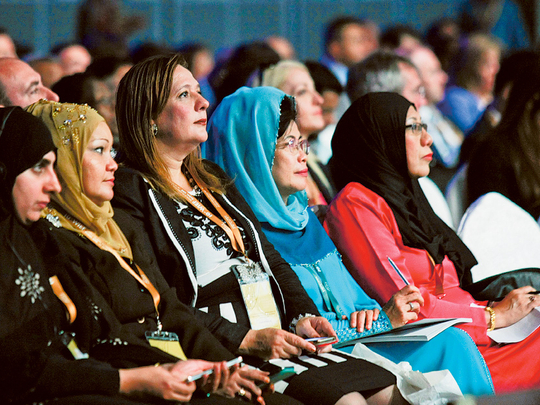
Dubai: Dubai aims to become a global hub for Islamic economy by increasing its cooperation with the world and create an infrastructure that can stimulate growth in the area.
Dubai World Islamic Economic Forum (WIEF) came to a close with record delegates with discussions surrounding around challenges faced for spurring growth in Islamic finance, to its role in economic growth. The 10th annual World Islamic Economic Forum held in Dubai was attended by 3,215 delegates from over 108 countries, breaching the previous London’s record.
The conference was attended by His Highness Shaikh Mohammad Bin Rashid Al Maktoum, Vice-President and Prime Minister of the UAE and Ruler of Dubai, Malaysian prime minister Dato Sri Mohd Najib Tun Abdul Razak, along with Eisa Kazim, governor of the Dubai International Financial Centre (DIFC), Hamad Bu Amim, president and CEO of Dubai Chamber of Commerce and Industry, and finance minister of Luxembourg, Pierre Gramegna, among others.
Eight global Leaders, 12 ministers, four central bank governors, also attended the three-day conference.
The forum called for greater partnerships and innovation, underpinned by Islamic values, to improve productivity, competitiveness and incomes that are essential to the stability and to accelerate improvements in the Islamic economy. The conference stressed on concerted efforts that need to be undertaken in several key areas to make Dubai as a global hub for Islamic economy.
“One is to enhance cooperation in terms of standards and certification. Establishing a unified regulatory authority to provide the framework for standards across halal industries will significantly accelerate growth,” Hamad Buamim, president and CEO of Dubai Chamber of Commerce and Industry.
“Likewise, we need to see increased cooperation and partnership between the public and private sectors. This is already happening with great success here in Dubai,” Bu Amim said.
The Forum recommended the establishment of the WIEF-IDB International Working Group on Waqf Development that acts as an information depository centre as well as a clearing house of information. It plans to promote the development of Islamic Finance to bridge economies and enhance economic activity and growth.
The forum resolved to continue to initiate and enhance discussions on the development of global halal industry, and to provide a platform for the development of borderless education and innovative technology.
The 11th forum will be held in Kuala Lumpur, Malaysia from October 27 to 29 next year.
SME coverage
Islamic finance will be the norm rather than an alternative, driving growth in small and medium trade in Islamic world, industry participants said.
Hussain Al Qemzi, Board Member of the Dubai Islamic Economy Development Centre and CEO of Noor Bank in the UAE, said that small and medium enterprises (SMEs) play a large role in driving Islamic trade finance, adding that more advanced supply chain optimisation measures are needed to promote their growth.
The share of Islamic trade finance on total global trade is still minuscule, which is at about 1.5 per cent. “Strengthening Islamic finance through proper documentation, increased customer awareness, ensuring industry standardisation and providing supportive regulatory frameworks are needed to boost Islamic finance, and in turn Islamic trade,” he said.
As a means for growth
A study has pointed out that 30 per cent of growth in capital markets, trigger a 20 per cent growth in the long term Gross Domestic Product per capita.
“The Sharia driven principles of risk sharing, non-interest bearing, asset backing social investments would lead to more wealth and more economic growth than debt finance. More equity driven system would generate more wealth,” said Khalid F. Howladar, global head of Islamic Finance, GCC financial institutions, Moody’s Investor Service Middle East.
Economies of the Middle East and North Africa (Mena) have a greater gross domestic product (GDP) growth compared to developed markets.












